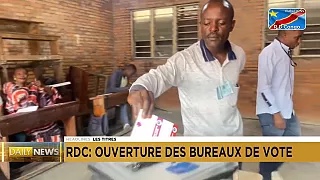The citizens of the Democratic Republic of Congo (DRC) have commenced voting in critical general elections.
The incumbent President Félix Tshisekedi is seeking reelection amid a fragmented opposition in a politically and security-charged atmosphere.
The first voter was spotted casting their ballot at 06:09 (04:09 GMT) in a polling station in Kisangani, located in the eastern part of the country, which, being an hour ahead of the west, began voting first.
The scheduled opening hours for polling stations are from 06:00 to 17:00 local time.
“I arrived at 4:00, it’s 6:00, and they haven’t started yet; they are not respecting the regulations!” complained Muhigo Rutigo, a 75-year-old resident, outside the Zanner polling station in the centre of Goma, the provincial capital of North Kivu.
Wednesday, (Today) has been declared a public holiday, and, as in previous elections, borders are closed, and domestic flights are suspended from midnight to midnight.
Approximately 44 million registered voters, out of a total population of around 100 million, are called upon to elect their president, as well as national and provincial deputies and, for the first time, municipal councillors. Another first is that Congolese in the diaspora are voting in five countries.
Over 100,000 candidates are in the running for the four elections. The President of Céni, Denis Kadima, pledged transparency in the process, with real-time monitoring of results compilation.
Several election observation missions are deployed.
With 25,000 people, the Catholic and Protestant churches’ mission is the largest, and its opinions and conclusions are traditionally closely followed. Its leaders promised on Tuesday a “parallel vote count” for the presidential
In this single-round election, 60-year-old Félix Tshisekedi, in power since early 2019, is running for a second term against 18 other candidates. His record is mixed, which he acknowledges, but he is asking for five more years to “consolidate the achievements.”
Throughout the campaign, he also criticized the alleged “foreign candidates,” suggesting that they were not patriotic enough in the face of the “aggressions” he particularly attributes to the Rwandan neighbour.
His main challenger, 58-year-old Moïse Katumbi, a wealthy businessman and former governor of the mining province of Katanga (southeast), has been particularly targeted by his attacks.
Among other presidential candidates are Martin Fayulu, 67, who claims victory was stolen from him in the 2018 election, and Dr Denis Mukwege, 68, a Nobel Peace Prize laureate for his work on behalf of raped women, known worldwide but a political novice.
Opponents believe the vote will not be transparent and suspect the regime of having prepared fraud long in advance by placing its men at the head of Céni or the Constitutional Court.
“The day of the vote will be calm; it’s at the time of the results that there could be problems,” predicted a Kinshasa voter on Tuesday.











